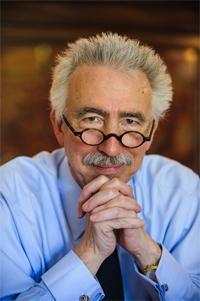Fifty years after the Free Speech Movement at Berkeley
And speech is still unfree there
This year marks the 50th anniversary of the Free Speech Movement, a massive student mobilisation in defence of free speech that took place at the University of California, Berkeley campus during the autumn of 1964. It inspired an unprecedented wave of student protest across the US and helped to define the radical legacy of the 1960s. The memory of this movement has resurfaced at times of intense political engagement of the student body. On these occasions, the meaning of the campaign and its broader significance have been fiercely contended.
This autumn [2014] the debate erupted once again, reaching the national media in the US. As someone who is not steeped in this tradition, I was intrigued by how the memories and myths of 1964 still haunt and galvanise the Berkeley campus. But what are we talking about when we talk about free speech at Berkeley?

Dirks, current Chancellor
In early September 2014, Nicholas Dirks, Berkeley’s chancellor, sent a message to the campus community that read, at first sight, like the usual start-of-the-year message that you would expect from somebody who is running a university. Dirks invited students and staff to “honor the ideal of Free Speech” while fostering civil, constructive dialogue in an environment in which everybody can feel safe and respected. What could go wrong with such a well-meaning message? In fact the reactions, on campus and in the outside world, have been swift and forceful.
Many commentators have analysed the message in legal terms. They have observed that the chancellor described free speech and civility as “two sides of a single coin”, arguing that “we can only exercise our right to free speech insofar as we feel safe and respected in doing so”. But protected speech is not necessarily civil, courteous speech. On the contrary, speech that needs protection is often uncivil, angry and offensive to many.
According to the current interpretation of the First Amendment to the American Constitution, civility is not a precondition for free speech. To introduce a criterion of civility would be an unacceptable limitation to the right to free speech. Furthermore, as Berkeley students remarked in their newspaper The Daily Californian, civility is a slippery notion: who gets to decide what counts as uncivil behaviour? The chancellor? The campus police? That an authority should be granted such an enormous discretion would hollow out the right to free speech. After all, the now-celebrated Free Speech Movement looked rather uncivil to its opponents in 1964.
SOURCE




6 comments:
Want to see civility for free speech at Berkeley?
Look no further than this to see what a cesspool Berkeley has become:
http://www.foxnews.com/opinion/2014/11/19/berkeley-students-surprising-reaction-to-isis-and-israeli-flags-on-campus/
The so-called Free Speech Movement was really about being free to use nasty, obscene, and offensive language to attack anyone who did not accept the Liberal nonsense of the time.
The First Amendment was intended to protect those who might wish the criticize any level of government. Before the Revolution, criticism of the King was punishable by death and all public officials were representatives of the King.
I personally find this story funny. Liberals are always screeching about free speech but are fond of shoving "speech codes" and "hate speech" laws down everyone else's throats.
I just find it really funny when the chickens come home to roost so to speak.
Gee I think i read a good quote on this somewhere, now where was it?
"HATE SPEECH" is free speech: The U.S. Supreme Court stated the general rule regarding protected speech in Texas v. Johnson (109 S.Ct. at 2544), when it held: "The government may not prohibit the verbal or nonverbal expression of an idea merely because society finds the idea offensive or disagreeable." Federal courts have consistently followed this. Said Virginia federal district judge Claude Hilton: "The First Amendment does not recognize exceptions for bigotry, racism, and religious intolerance or ideas or matters some may deem trivial, vulgar or profane."
Now where did i see this quote?
How many times have we seen someone calmly and politely stating their position only to have the listeners scream hate speech, racism etc. Civility should apply to the hearers as well as the speakers or it doesn't work.
And liberals want Free Speech only for themselves
Post a Comment